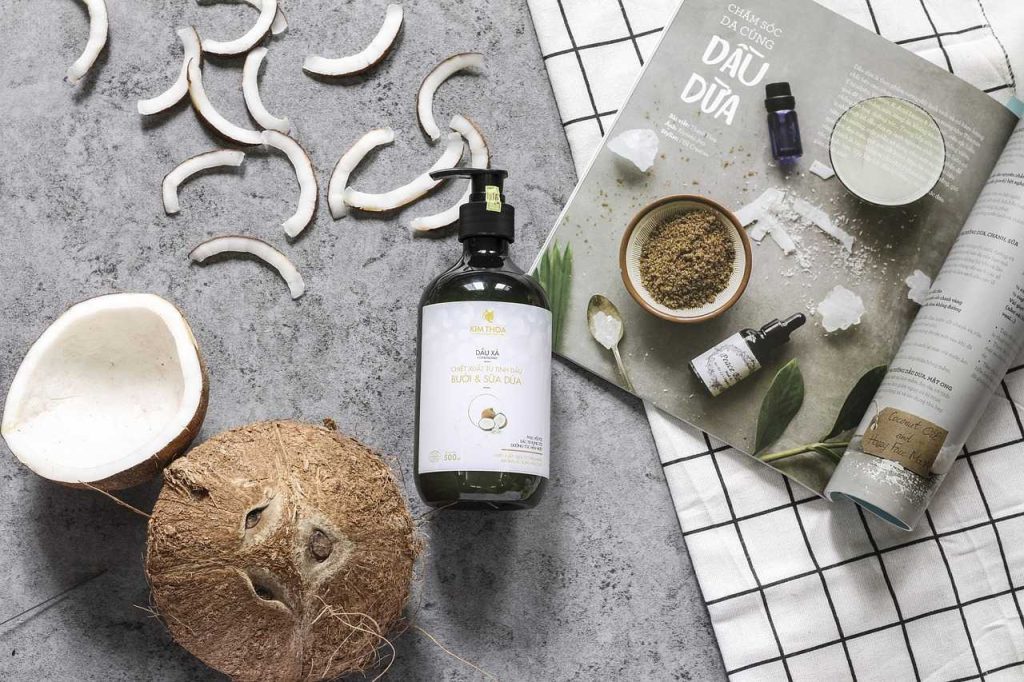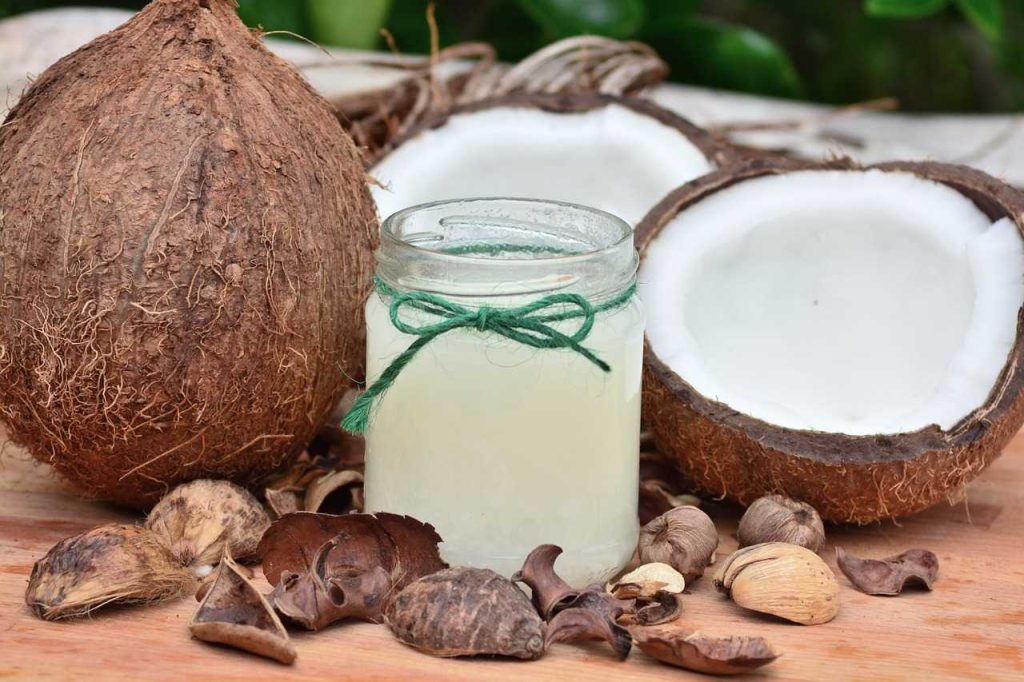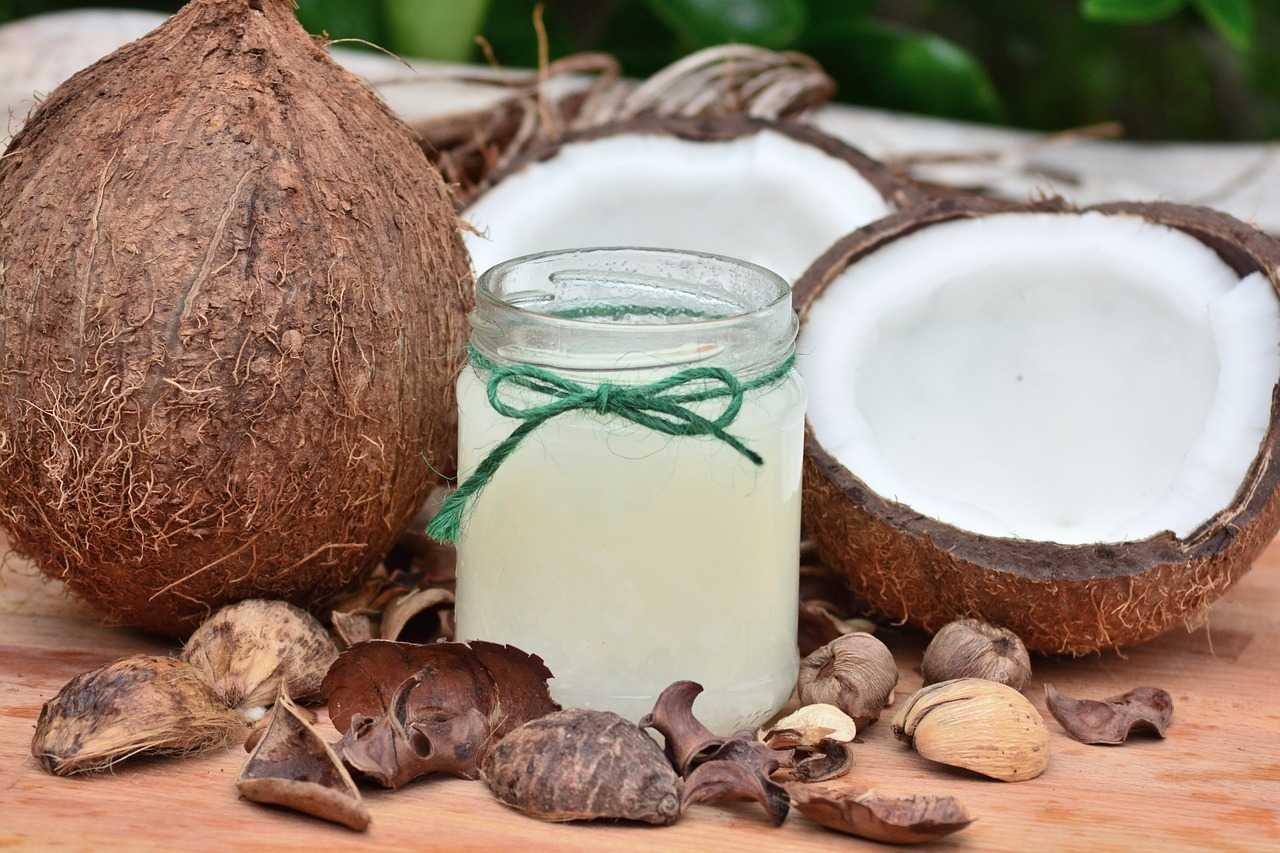Coconut oil is one of the most versatile and natural beauty products, and its benefits for hair are undeniable. For centuries, people in tropical regions have used coconut oil for its deep moisturizing and nourishing properties. Whether you’re looking to enhance hair shine, repair damage, or stimulate growth, this natural oil has the power to transform your locks. In this guide, we’ll explore the in-depth benefits of coconut oil for hair, how it works, and how you can easily incorporate it into your hair care routine for lasting results.
1. What Makes Coconut Oil So Beneficial for Hair?

Coconut oil’s molecular structure is what makes it a superstar ingredient in hair care. Its small, medium-chain fatty acids allow it to penetrate the hair shaft more effectively than other oils, ensuring that the hair receives maximum nourishment. Additionally, it contains a rich array of vitamins, antioxidants, and essential proteins that contribute to overall hair health, making it an ideal solution for multiple hair problems.
Key Components of Coconut Oil:
- Lauric Acid: This fatty acid allows coconut oil to penetrate deep into the hair shaft, unlike many other oils that sit on the hair’s surface.
- Vitamin E: A potent antioxidant that fights free radicals and repairs damaged hair follicles, leading to healthier and stronger hair.
- Capric Acid and Caprylic Acid: These acids provide coconut oil with its antifungal and antibacterial properties, helping to keep the scalp healthy and free from infections.
- Essential Proteins: Help to rebuild and strengthen hair, reducing damage and preventing breakage.
2. Key Benefits of Coconut Oil for Hair
A. Deep Conditioning Power
One of the main reasons coconut oil is so popular in hair care is its ability to deeply condition hair. Unlike commercial conditioners that may coat the hair and leave it feeling soft temporarily, coconut oil penetrates the hair shaft, delivering long-lasting moisture. Regular use of coconut oil as a conditioner can leave your hair soft, smooth, and manageable, especially if your hair is prone to dryness or damage.
How to Use:
- Deep Treatment: Warm a few tablespoons of coconut oil and apply it to damp hair, working it from root to tip.
- Leave it on for 30 minutes to an hour for deep penetration, then rinse with a gentle shampoo.
- Overnight Treatment: For very dry or damaged hair, leave the coconut oil on overnight and wash it out in the morning.
B. Reduces Protein Loss
Hair is primarily made up of protein, and frequent washing, heat styling, and exposure to environmental pollutants can lead to protein loss. Coconut oil has been scientifically proven to reduce protein loss in both damaged and undamaged hair. This helps maintain the hair’s strength, making it less prone to breakage and split ends.
How to Use:
- Apply coconut oil as a pre-wash treatment to help reduce protein loss during washing.
- Leave the oil in for 15-20 minutes before shampooing.
C. Stimulates Hair Growth

Massaging coconut oil into your scalp not only nourishes the hair follicles but also stimulates blood circulation. Improved circulation means more oxygen and nutrients are delivered to your hair follicles, which can encourage faster and healthier hair growth. Additionally, coconut oil helps create an ideal scalp environment by fighting dandruff, fungal infections, and dryness, all of which can impede hair growth.
How to Use:
- Warm a small amount of coconut oil and massage it into your scalp for 5-10 minutes.
- Leave it on for an additional 20 minutes or overnight before washing it out.
- Repeat this process 1-2 times a week for optimal results.
D. Fights Dandruff and Scalp Infections
Dandruff, caused by either dry skin or fungal infections, can lead to an itchy and irritated scalp. Coconut oil’s antifungal and moisturizing properties help combat dandruff and other scalp conditions such as eczema and psoriasis. Regular use can soothe the scalp, reduce flakiness, and keep it hydrated.
How to Use:
- Mix coconut oil with a few drops of tea tree oil or peppermint oil (both known for their antifungal properties) to boost effectiveness.
- Massage this blend into your scalp and leave it for 30 minutes before washing it off with a mild shampoo.
E. Adds Shine and Controls Frizz
For those with frizzy or dull hair, coconut oil can act as a natural serum. It smooths the cuticle layer of the hair, preventing moisture loss and reducing frizz. The oil also imparts a healthy shine without leaving hair greasy, making it a great finishing product after styling.
How to Use:
- Take a small amount of coconut oil and rub it between your palms.
- Lightly smooth it over the surface of your hair, focusing on the ends and any areas prone to frizz.
F. Prevents and Treats Split Ends
Split ends can make your hair look frizzy and unkempt. While coconut oil cannot repair split ends, it can prevent them from occurring by strengthening the hair and locking in moisture. Using coconut oil regularly on the ends of your hair can protect them from damage, ensuring your hair remains healthy and strong.
How to Use:
- After washing your hair, apply a small amount of coconut oil to the ends to prevent drying and split ends.
G. Protects Hair from Lice
In addition to its antifungal properties, coconut oil can also protect against lice. When combined with anise oil, coconut oil has been shown to be as effective as over-the-counter lice treatments, but without the harsh chemicals.
How to Use:
- Apply coconut oil to the hair and scalp, then use a fine-toothed comb to remove lice.
- Repeat as necessary to ensure that all lice and eggs are eliminated.
3. How to Incorporate Coconut Oil Into Your Hair Routine
Incorporating coconut oil into your hair care routine is simple and effective, regardless of your hair type. Here are some easy ways to use coconut oil for maximum benefit:
A. Coconut Oil Hair Mask
For deep nourishment, try a coconut oil hair mask. You can combine it with other natural ingredients for additional benefits.
- Ingredients:
- 2 tablespoons of coconut oil
- 1 tablespoon of honey
- 1 tablespoon of aloe vera gel
- Instructions:
- Mix all the ingredients together until well-combined.
- Apply to your hair, focusing on the ends and dry areas.
- Leave on for 30-60 minutes before rinsing thoroughly with shampoo.
B. Coconut Oil Pre-Wash Treatment
To protect your hair from the stripping effects of shampoo, use coconut oil as a pre-wash treatment.
- Instructions:
- Apply warm coconut oil to dry hair and let it sit for 20-30 minutes.
- Rinse thoroughly before shampooing to prevent protein loss and damage.
C. Leave-In Conditioner
Coconut oil can double as a leave-in conditioner for smooth, shiny hair.
- Instructions:
- Apply a small amount to damp hair after washing, focusing on the ends.
- Style your hair as usual and enjoy frizz-free, shiny hair.
4. Coconut Oil for Different Hair Types
A. Dry or Damaged Hair
Coconut oil is a must-have for dry or damaged hair. Its deep conditioning properties can help restore moisture and strength to brittle, damaged strands.
B. Oily Hair
If you have oily hair, use coconut oil sparingly. Apply it only to the ends or use it as a pre-wash treatment to avoid weighing your hair down.
C. Curly or Textured Hair
Curly and textured hair can greatly benefit from coconut oil’s moisture-retaining abilities. Regular application helps define curls, reduce frizz, and maintain hydration.
5. Choosing the Right Coconut Oil

When choosing coconut oil for hair care, it’s essential to select the right type:
- Virgin Coconut Oil: This is the purest form and retains all the nutrients beneficial for your hair.
- Refined Coconut Oil: While still effective, this version undergoes more processing and may not have as many nutrients as virgin coconut oil.
- Organic: Organic coconut oil is free from harmful chemicals and pesticides, making it the best choice for hair care.
6. Coconut Oil and Hair Concerns: Myths Debunked
A. Will Coconut Oil Weigh Down Hair?
If applied excessively, coconut oil can leave your hair feeling greasy. To avoid this, start with a small amount, particularly for fine or thin hair, and apply it primarily to the ends.
B. Can Coconut Oil Cure Hair Loss?
While coconut oil can promote healthier hair growth and prevent damage, it cannot cure genetic hair loss conditions. However, it can reduce hair fall caused by breakage and scalp issues.
C. How Often Should You Use Coconut Oil?
This depends on your hair type and needs. For dry or damaged hair, using coconut oil 1-2 times a week is ideal. For those with oily or fine hair, using it as a pre-wash treatment every couple of weeks may be more suitable.
7. Conclusion
Coconut oil is a powerhouse ingredient for hair care, offering a range of benefits from deep conditioning and frizz control to promoting growth and preventing damage. Its natural composition of fatty acids, vitamins, and antioxidants makes it a safe and effective alternative to chemical-laden products. By incorporating coconut oil into your routine, you can enjoy healthier, shinier, and stronger hair over time.

